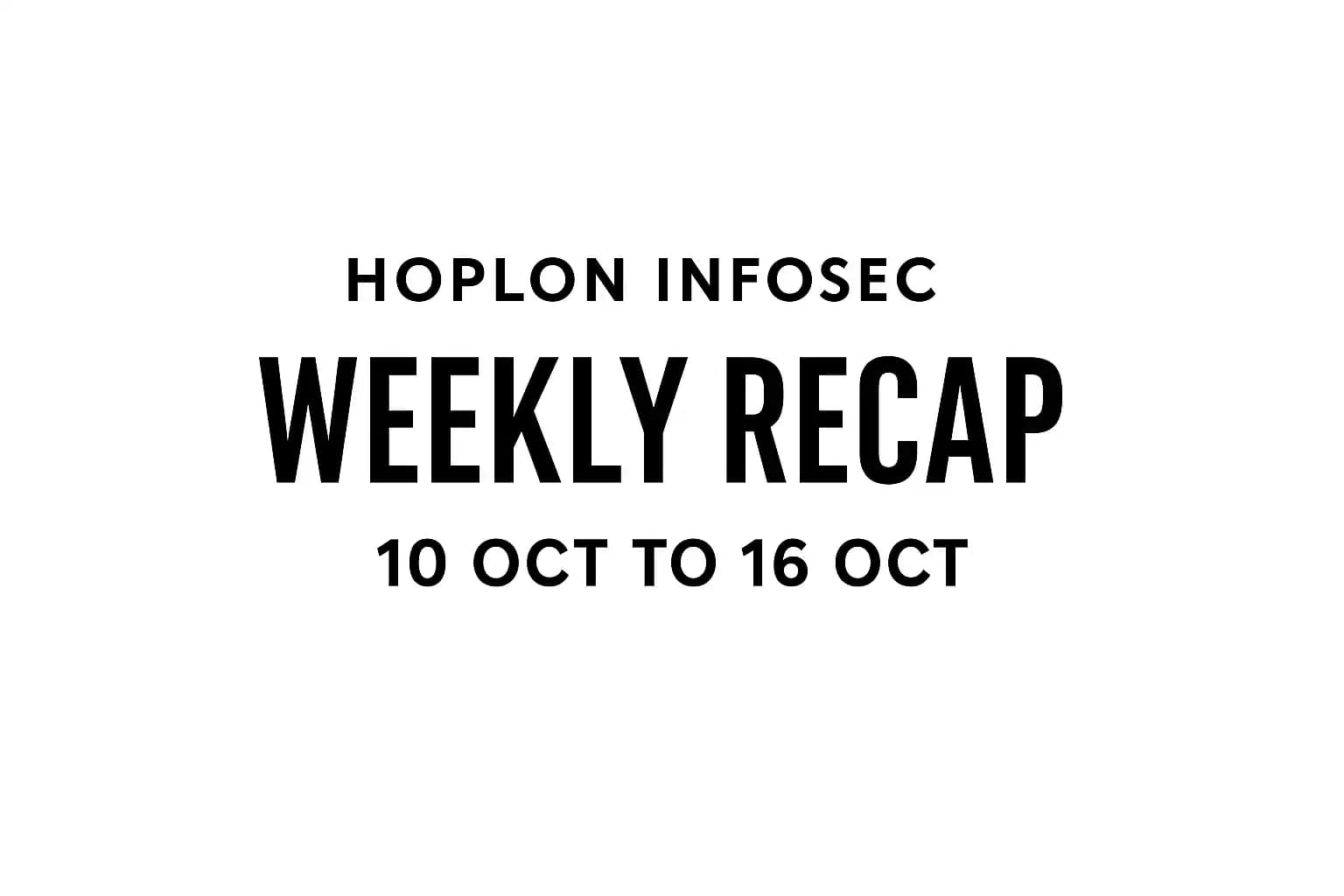Hoplon Infosec's Weekly Recap 10 Oct to 16 Oct

Hoplon InfoSec
17 Oct, 2025
This week, it felt like the internet had too much coffee. All at once, there were security updates, strange outages, and sneaky malware. The Hoplon Infosec Weekly Recap for October 10-16 looks at the stories that made IT teams sweat, users panic, and hackers smile with glee.
When a Small Tool Became a Big Problem
The 7-Zip vulnerability is something that surprised almost everyone. A lot of us have used 7-Zip at least once. You install it and forget about it, and then you use it to unzip files. It turns out it wasn't so safe after all. Hackers could run bad code on your computer from a distance because of the bug, which gave them full access to your system.
This wasn't just a random problem; it was a wake-up call. A lot of security experts said it was like leaving the back door of your house open because "it's just the back door." People always thought 7-Zip was safe and easy to use, which is what made the flaw so dangerous.
This event stood out in Hoplon Infosec's Weekly Recap for the week of October 10 to 16 as a reminder that even the tools we trust the most can turn against us if we don't pay attention to them for too long.
Read more
The WordPress Problem That Wouldn't Go Away
A few days later, WordPress had another problem: the Service Finder theme was vulnerable. Small businesses that depended on the theme were suddenly worried about having their sites taken over. A lot of people didn't know that hackers could use a flaw in the theme's code to add harmful scripts.
One web admin wrote on a forum, "I woke up to find my homepage selling crypto coins I've never heard of." That pretty much sums up how crazy things got. WordPress themes are like the clothes that websites wear. This one had a hole in the middle.
The good news is that a quick update fixed the problem, but it did remind thousands of users to back up their sites on a regular basis.
Read more
The Android Virus Chase and Mobile Mayhem
The Android virus removal guide came next, and it was more personal. It wasn't a blog full of tech jargon like most. It explained things in a way that regular people could understand, like people who just want their phones to stop acting weird. Hoplon showed us how to find fake apps, clear caches, and get rid of hidden malware step by step.
This article stood out in Hoplon Infosec's Weekly Recap for the week of October 10 to 16 because it was so useful. People could really follow it without getting too stressed out. And let's be honest, who hasn't had that one time when their phone started showing ads out of nowhere? This guide was like a calm voice in a stormy digital world.
Read more
The GitHub Trick That No One Saw Coming
The Astaroth malware attack was the week's "plot twist." Cybercriminals used GitHub, a site that developers use a lot, to store their malware. It's like thieves hiding out in a police station. Astaroth quietly stole banking information while posing as legitimate code repositories.
Security researchers figured it out quickly, but it still made people wonder how attackers keep changing. The article explained how Astaroth avoids being found, and reading it was like watching a spy movie unfold. Every click and every connection were planned with scary accuracy.
That's why Hoplon Infosec's Weekly Recap from October 10 to 16 was more than just a summary. It showed how quickly cyber threats change, which most people don't know. One day it's phishing emails, and the next day it's GitHub projects that are used as weapons.
Read more
Stealit Malware and the Windows Nightmare
The Stealit malware attack was another headline that shook the cybersecurity world. It was aimed at Windows systems and stole data from browsers, email clients, and saved passwords without anyone knowing. This wasn't just a one-time thing; it was part of a new wave of attacks that were aimed at regular people instead of big businesses.
What made Stealit so scary was how "normal" it looked. No ransom notes or big warnings. It just took what it wanted without making a fuss. The Hoplon article made it clear: if you use Windows and save passwords in your browser, you could be a target. It felt like it was about me because it was.
https://hoploninfosec.com/stealit-malware-attacks
The Veeam Backup Vulnerability and the False Sense of Security
The Veeam backup vulnerability was another shocker that came out in the middle of the week. It's strange how the systems that are supposed to keep data safe can also let attackers in. The flaw let people who weren't supposed to access backup files, which meant that hackers could restore data on their own systems and get private information.
This story from Hoplon Infosec's Weekly Recap for the week of October 10 to 16 showed that backups aren't always as safe as we think they are. The lesson was clear: security doesn't stop at encryption; it includes how you store your recovery files as well.

RDP Vulnerabilities: When Remote Access Becomes Dangerous
Then there were the Remote Desktop Protocol (RDP) flaws, which are one of those stories that hits home for IT teams. RDP is great for working from home, but hackers love it too. The flaw let attackers run code from afar, making the tool a digital backdoor.
Not only did Hoplon's coverage give you the facts, it also made you think about what was happening. Imagine that you log into your company's server and think you're safe, but someone else is secretly connected in the background. Isn't that creepy? That's how it is with weak RDP setups.
The Internet's Mini Panic and YouTube's Global Outage
The YouTube outage is something that should be mentioned in every weekly recap. One night, screens froze, comments wouldn't load, and everyone went crazy for an hour. Some people thought their Wi-Fi was broken, while others thought it was just a problem in their area. Google later confirmed that the service was down worldwide.
It wasn't a security issue, but it did remind everyone how much we rely on platforms that can disappear in an instant. The event added a lighter, almost relatable note to Hoplon Infosec's Weekly Recap for the week of October 10-16, showing that not every tech panic is about hackers; sometimes it's just a glitch in the system.
SimonMed Data Breach: Personal Information Was Exposed
The SimonMed data breach revealed private patient information online, which made the week even more interesting in the healthcare field. There was no official CVE, but files that were accessed without permission included names, test results, and personal information.
This occurrence made a crucial point in Hoplon Infosec's Weekly Recap from October 10 to 16: even businesses that work in "sensitive sectors" can make blunders. Patients were shocked to be reminded of how readily digital privacy may be violated.
Read more
Fake Websites on macOS Homebrew: A Trap for Developers
Even macOS users who were very tech-savvy weren't safe. People were fooled into downloading dangerous software from fake Homebrew sites. Developers and enthusiasts alike were caught off guard.
Hoplon's step-by-step guide revealed how attackers might make false sources look so legitimate that even people who had been online for a long time could fall for them. This story from Hoplon Infosec's Weekly Recap from October 10 to 16 stood out because it proved that everyone, no matter how good they are, needs to be vigilant online.
The Microsoft Teams Deception and Vanilla Tempest
The last story of the week was about Microsoft's battle with the Vanilla Tempest group, which mixed spying with new ideas. Hackers were using fake profiles on Teams channels to spread malware and trick people into opening harmful attachments. Microsoft acted quickly to shut them down, but the way they did it was daring.
It was like watching a cyber version of "Catch Me If You Can." Hackers used common business tools to trick employees, which shows that social engineering is still the weakest link.
A Week That Changed Digital Trust
It was clear by the end of Hoplon Infosec's Weekly Recap from October 10 to 16 that cybersecurity isn't just about complicated codes and firewalls. It's about being aware of how people act and the small things that can make or break our digital safety.
This week's news stories, from the 7-Zip surprise to the YouTube blackout, showed us just how easily we can lose trust online. It might be calmer next week. But in cybersecurity, calm often feels like the calm before the storm.
Explore our main services:
· Deep and Dark Web Monitoring
· ISO Certification and AI Management System
· Web Application Security Testing
For more services, go to our homepage.
Follow us on X (Twitter) and LinkedIn for more cybersecurity news and updates. Stay connected on YouTube, Facebook, and Instagram as well. At Hoplon Infosec, we’re committed to securing your digital world.
Share this :